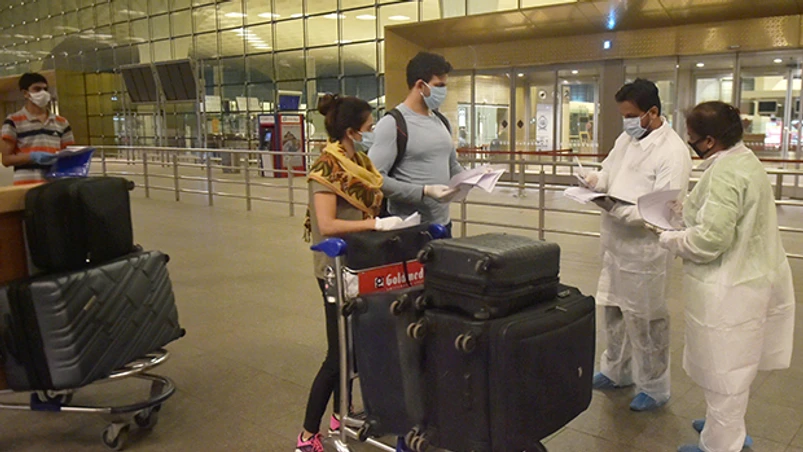 Domestic flights to resume on May 25: Here's what is allowed and what isn't
Domestic flights to resume on May 25: Here's what is allowed and what isn't
Here is what is going to change for passengers as they fly from Monday
Sukanya Roy New Delhi
)
The government announced on Wednesday that domestic airline operations would resume on May 25.
However, the Union home ministry had earlier this week, prohibited air transport till May 31 while announcing the extension of lockdown.
India grounded domestic air transport on March 24 to contain the spread of the coronavirus. This was the day before the lockdown came into effect.
International flights, which were stopped on March 22, will remain shut.
Civil Aviation Minister Hardeep Singh Puri announced in a Twitter message that “Domestic civil aviation operations will recommence in a calibrated manner from Monday, May 25. All airports and carriers are being informed to be ready for operations from May 25.
It was decided earlier to keep the middle seat vacant to ensure social distancing.However, Puri has said it is not viable as it will lead to a hike in ticket prices, and the prescribed social distancing norms would still not be met.
Puri’s tweet caught airlines and airports off guard as they were preparing to resume operations from June 1. But later in the evening, the civil aviation secretary held a meeting with chief executive officers of airlines to discuss the service resumption plan.
A senior government official said flights would be allowed to all cities, irrespective of whether they were in the red zone or the green. An earlier plan of resuming flights only between cities in green zones didn’t work as airlines dismissed it as unviable.
Also Read
A source said only 35 per cent of flights would be allowed on metro routes in the first phase, in order to maintain social distancing across airports.
Airlines may be permitted to fly 50 per cent of flights between metros and non-metros. Delhi Airport, which usually has more than 60 aircraft movements per hour, would allow only 14 flights per hour, he pointed out.
Initially, airports will operate for a limited period in a day to make time for sanitisation of terminals.
Many airlines that were on the brink of bankruptcy, welcomed the government decision to open up air traffic.
This morning, the Airports Authority of India (AAI) issued a standard operating procedure (SOP) for recommencement of domestic flights.
Here is what is going to change for passengers as they fly in the time of coronavirus:
The government's coronavirus tracing app, Aarogya Setu, is a must for all travellers except children below 14. If they don't show "green" or do not have the government contact tracing app, they will not be allowed in.
Face masks, gloves and hand sanitisers will be compulsory. Hand sanitiser containers of up to 350 ml will be allowed in hand baggage.
All staff should have hand sanitisers and Personal Protective Equipment as directed by the home ministry.
Passengers are advised to familiarise themselves with the new procedures at the airport, especially about social distancing norms and ensuring minimum touching of various surfaces.
If you are traveling, you should also be familiar with baggage limitations, Covid-19 questionnaire, possibly slower processes at airports and use of authorised taxis to reach the airport, it said.
Only personal vehicles or select cab services will be allowed to take passengers and staff to the airport or from it.
Airport operators should make arrangements for sanitizing baggage before entry.
All entry gates of the terminal will be opened to avoid crowding.
The ministry has proposed that passengers should reach the airport at least two hours before a flight and do away with passenger identity checks at airport entry gates to minimise rush at the entry points. Passengers will be allowed into the terminal building if their flights are within four hours.
Passengers can do web check-in and carrying cabin baggage should not be allowed in the initial phase of operations, as per the document.
Further, the ministry has suggested that passengers denied travel due to high temperature or age should be permitted to change their date of travel without penalty, and airlines would have to maintain their records.
Newspapers or magazines will not be provided in the terminal buildings or lounges.
Once flights land, passengers will be allowed to leave the plane in batches, sequentially
IndiGo, India's largest airline, will fill its airport buses at 50 per cent capacity when service resumes. The airline will also discontinue on-board meal services, CEO Ronojoy Dutta told employees in April.
Delhi airport has prepared floor-marked passenger areas on the kerbside and in-terminal to ensure social distancing.
Taxis at Kerala’s Cochin International Airport will have a fibre-glass partition between the driver and passengers. The driver will provide a sanitiser to passengers before the journey. Only two passengers, to be seated at the rear, will be permitted.
Well, airlines have suffered huge losses in the lockdown—some estimates say that the number could be as high as $1.75 billion in the first quarter of FY21. The result will be that the Indian aviation business will shrink, as some airlines shut down and others merge.
The government is considering temporarily setting caps and floors on airfares once air transport resumes after the lockdown, in a bid to “protect both consumers and airlines”, officials aware of the matter said.
Airlines estimate they would have to increase average fares by anything between 50-100 per cent to break even.
More From This Section
Topics :Hardeep Singh PuriCoronavirusLockdowndomestic flightsIndiGoIndiGo AirlinesDelhi airportinternational flightsflightsIndian airlines
Don't miss the most important news and views of the day. Get them on our Telegram channel
First Published: May 21 2020 | 3:14 PM IST

